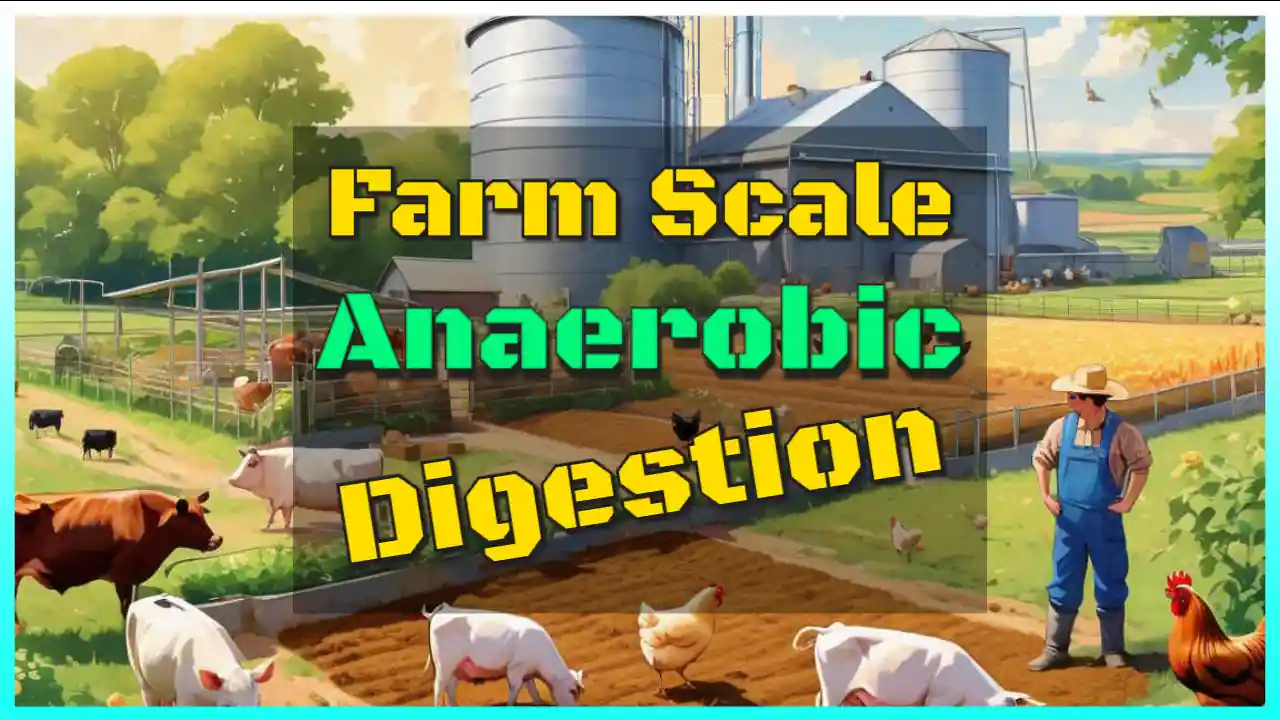Farm scale anaerobic digestion (AD) has emerged as a pivotal solution for converting organic waste into valuable biogas while addressing critical environmental challenges. On-farm anaerobic digestion plants, designed primarily for processing manure, offer farmers an opportunity to generate renewable energy, mitigate pollution, and enhance soil health. This article delves into the intricacies of farm-scale anaerobic digestion, exploring its economic viability, design considerations, and potential pitfalls while emphasizing the importance of professional guidance in plant construction and operation.
Farm Biogas – Key Takeaways
- Economic Motivation: Farm-scale anaerobic digestion systems are primarily established to harness biogas from manure, with additional organic feedstocks potentially enhancing production.
- Design and Functionality: Most installations utilize single-stage continuously stirred tank reactors (CSTRs), optimized for low-cost operation but often at the expense of long-term viability.
- Environmental Benefits: These systems not only generate renewable energy but also play a crucial role in reducing farm runoff and mitigating odors, contributing positively to the surrounding ecosystem.
- Risks of Low-Cost Solutions: Economic pressures can lead to subpar installations, resulting in operational failures and reduced biogas yield, highlighting the need for professional design and construction practices.
- Integration of Food Waste: Incorporating household food waste can significantly increase biogas production, but inadequate infrastructure can lead to operational challenges.
Understanding On-Farm Farm Scale Anaerobic Digestion
On-farm, or what are also known as farm-scale anaerobic digestion plants, are most often built to provide an income from the biogas that is made from manure. The manure which is treated may be from stock litter waste created when stock is kept under cover, plus farm slurries and farmyard runoff. There may be other sources of organic feedstock added to these plants; however, in most cases, they are primarily intended to take manure.
Table 1: Farm Scale Anaerobic Digestion Biogas Production Potential from Different Feedstocks
| Feedstock Type | Estimated Biogas Yield (m³/ton) |
|---|---|
| Manure | 20 – 30 |
| Crop Residues | 30 – 40 |
| Food Waste | 50 – 70 |
The Role of Farm Scale Anaerobic Digestion in Agriculture
Anaerobic digestion is a biological process that decomposes organic matter in the absence of oxygen, producing biogas—a mixture primarily composed of methane (CH₄) and carbon dioxide (CO₂). In agricultural settings, manure from livestock serves as a primary feedstock for AD plants, alongside other organic materials such as crop residues and, increasingly, food waste. This biogas can be utilized for heating, electricity generation, or as a vehicle fuel, thereby creating an additional revenue stream for farmers.
Economic Viability and Design Considerations for Farm Scale Anaerobic Digestion
Due to economic constraints and the need to avoid time spent running these units and maintaining them, these anaerobic digestion systems are invariably the simplest of designs and built to the lowest budgets possible. In fact, in many cases, these plants are what is known as a “distress purchase,” because the main motivation for installation may be a need to reduce farm runoff pollution from the working areas of farm buildings, and also in highly nitrate-sensitive watercourse areas, pollution of nearby watercourses. Another reason for installing these plants can also be for odor reduction.
Table 1: Typical Characteristics of Farm-Scale Anaerobic Digesters
| Feature | Specification |
|---|---|
| Type | Single-stage CSTR |
| Solids Concentration | 4% – 5% |
| Operating Temperature | Mesophilic (35°C) |
| Feedstock | Primarily manure with potential food waste |
| Common Issues | Blockages, downtime, maintenance challenges |
The financial viability of these plants is often finely balanced. There have been a number of cases where budgets have been pared down, and the resulting newly installed biogas installations have been almost too cheap for viable operation. Cheap tank construction and rushed installation, with the aim of keeping costs down and minimizing construction periods so that the plant owner can commission the facility rapidly and begin to get payback very quickly, can put so much pressure on installation contractors that too many corners are cut. Such plants seldom meet expectations, and the design life of them can, by experience, be remarkably short. It is unfortunate that in current times, when there are many anaerobic digestion EPC contractors vying for work, each is being forced to compete on price. This means that we can expect a surprisingly large rate of plant failures in the next few years for the owners of budget on-farm biogas digesters.
Farm Scale Anaerobic Digestion – Common Pitfalls and Challenges
- Inadequate Design and Construction: Due to the competitive landscape, many contractors cut corners to reduce costs, resulting in systems that are prone to failure. Poor tank construction and rushed installations can significantly shorten the lifespan of AD plants.
- Operational Inefficiencies: Budget plants often lack the sophisticated infrastructure needed to handle diverse feedstocks, particularly food waste. The addition of food waste can lead to blockages and operational downtime, undermining the intended benefits.
- Environmental Compliance: While AD systems can reduce farm runoff and lower greenhouse gas emissions, improper design may lead to non-compliance with environmental regulations, resulting in fines and operational disruptions.
Many Farm Scale Anaerobic Digestion plants of this type currently being put forward in bids by the owners of on-farm biogas plants to accept additional household food waste. While this may be a salvation for the farming business, as accepting up to 10 percent of its throughput as food waste will greatly increase the biogas yield, low-cost budget biogas plants seldom possess sufficiently sophisticated pipework and pumping equipment for this use. The result, seen in many such food waste co-generation contracts, has been that adding food waste has resulted in plant blockages, lost biogas production due to excessive downtime, and unhappy council waste disposal departments. The owners of on-farm biogas digesters need to take professional advice from expert biogas plant designers before they bid and include in their prices for upgrading their biogas plant systems before they start to add food waste.
The Importance of Professional Guidance
Farmers considering the installation of anaerobic digestion systems for farm scale anaerobic digestion should seek expert advice from qualified biogas plant designers. This guidance is crucial for ensuring that the design meets the specific needs of the farm, including:
- Capacity Planning: Assessing the appropriate size and design of the digester based on expected feedstock availability and energy needs.
- Infrastructure Upgrades: Ensuring the necessary upgrades are made to accommodate additional organic materials like food waste.
- Maintenance and Operation: Developing a maintenance plan that addresses potential issues before they escalate.
We should applaud farming businesses that are taking on board a real financial risk in installing farm biogas plants. Not only are they improving the environment of their farms for the good of the general public, but they are also providing much-needed renewable energy, without which governments would be unable to reduce the rate of global warming caused by greenhouse gases emitted by fossil fuel consumption.
Farm Scale Anaerobic Digestion – Conclusion
The integration of on-farm anaerobic digestion presents an invaluable opportunity for farmers to enhance sustainability, reduce waste, and generate renewable energy. However, the economic realities and technical challenges associated with these systems necessitate a thoughtful approach to design and operation. By investing in high-quality farm scale anaerobic digestion installations and seeking professional guidance, farmers can mitigate risks and maximize the environmental and financial benefits of anaerobic digestion.

Farm Scale Anaerobic Digestion FAQs
Q1: What is anaerobic digestion?
A1: Anaerobic digestion is a biological process that breaks down organic matter in the absence of oxygen, producing biogas that can be used as renewable energy.
Q2: What types of feedstock can be used in on-farm anaerobic digesters?
A2: Primarily manure, but also includes crop residues and household food waste, which can enhance biogas production.
Q3: What are the main challenges of low-cost farm scale anaerobic digestion plants?
A3: Common challenges include operational inefficiencies, maintenance issues, and potential regulatory non-compliance due to substandard design.
Q4: How can farmers improve the viability of their anaerobic digestion systems?
A4: By seeking professional design and construction advice, conducting thorough planning for capacity and infrastructure, and implementing a robust maintenance strategy.
Q5: What are the environmental benefits of anaerobic digestion?
A5: AD systems reduce farm runoff, lower greenhouse gas emissions, and produce renewable energy, contributing to a more sustainable agricultural practice.
This enhanced understanding of farm-scale anaerobic digestion underscores the importance of quality installations and the potential for improved agricultural sustainability. Through careful planning and professional support, farmers can effectively harness the benefits of this innovative waste management solution.





Leave a Reply